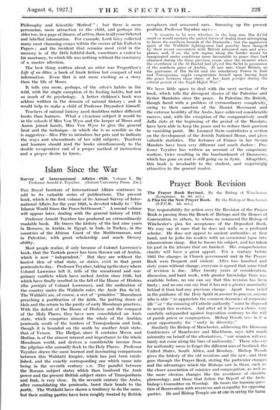Islam Since the War
Survey of International Affairs-1925. Volume I. By Professor Arnold J. Toynbee. (Oxford University Press. 25s.) Tim Royal Institute of International Affairs continues to add to its valuable series of publications. The present book, which is the first volume of its Annual Survey of Inter- national Affairs for the year 1925, is devoted wholly to " The Islamic World Since the Peace Settlement." A second volume will appear later, dealing with the general history of 1925.
Professor Arnold Toynbee has produced an extraordinarily readable book. He traces the history of the last nine years in Morocco, in Arabia, in Egypt, in Irak, in Turkey, in the countries of the African Coast of the Mediterranean, and in Palestine, with great scholarship and much literary ability.
Most people realize, if only because of Colonel Lawrence's book, that the Turkish power has been thrown out of Arabia, which is now independent." But they are without the haziest idea of what state, or states, exist in that great peninsula to-day. Professor Toynbee, taking up the story where Colonel Lawrence left it, tells of the sensational and san- guinary conflicts which have racked Arabia since 1920, but which have finally resulted in the fall of the House of Hashim (the proteges of Colonel Lawrence), and the unification of the country under the Wahhabi ruler, the Amir Ibn Sa'ud. The Wahhithi are, of course, a sect of primitive" Mussulmen preaching a purification of the faith, the putting down of idols and the return to the purity of early Musulman practices. With the defeat of the House of Hashim and the conquest of the Holy Places, they have now consolidated an Arab state, which comprises almost the whole of the Arabian peninsula south of the borders of Transjordania and Irak, though it is bounded on the south by another Arab state, that of Yemen. The Hedjaz, since it contains Mecca and Medina, is of the utmost interest and importance to the whole Musulman world, and derives a considerable income from the pilgrims who annually flock to the Holy Places. Professor Toynbee draws the most learned and fascinating comparisons between this Wahhabi Empire, which has just been estab- lished, and the exactly corresponding one which came into being in the seventh century A.D. The parallel between the Roman subject states which then bordered the Arab power and the present British subject states of Transjordania and Irak, is very close. In the seventh century the Arabs, after consolidating the peninsula, burst their bonds to the Borth. The Wahhabl have shown a tendency to do the same, but their raiding parties have been roughly treated by British
aeroplanes and armoured cars. Summing up the present position, Professor Toynbee says :-
" It remains to be seen whether, in the long run, Ibn Sa'ud could or would restrain the united forces of Arabia from attempting to burst the northern bounds of the Peninsula ; but the aggressive spirit of the Wahhabi fighting men had possibly been damped by their recent encounters with British armoured cars and sere,- planes, and, if so, the new regime along the border would be inaugurated under conditions more favourable to peace than had obtained during the three previous years, since the moment when the overthrow of the Al Rashid had pled Ibn Sa'ild in possession of the northern gates of Arabia. At any rate, Great Britain, as the patroness of Ibn Sa'fid and the mandatory Power in Irak and Transjordan, might congratulate herself upon having kept the peace between these three of her Arab proteges during the critical period of the Najc1I-Hijazt War."
We have little space to deal with the next section of the book, which tells the divergent stories of the Palestine and Syrian Mandates since the peace. In Palestine the BritisN though faced with a problem of extraordinary complexity, owing to their sanction of the Zionist Movement and the extreme hostility of the Arabs, have achieved considerable
success, and, with the exception of the comparatively small Jaffa riots at the beginning of the period of the Mandate, have been able to keep the peace and to reduce their garrison to vanishing point. Mr. Leonard Stein contributes a section on the development of the Jewish National Home, and gives valuable statistics. The fortunes of France in her Syrian Mandate have been very different and much darker ; Pro- fessor Toynbee has written an account of the sanguinary warfare, twice resulting in the bombardment of Damascus, which has gone on and is still going on in Syria. Altogether, this book is invaluable to the student, and surprisingly attractive to the general reader.






































 Previous page
Previous page